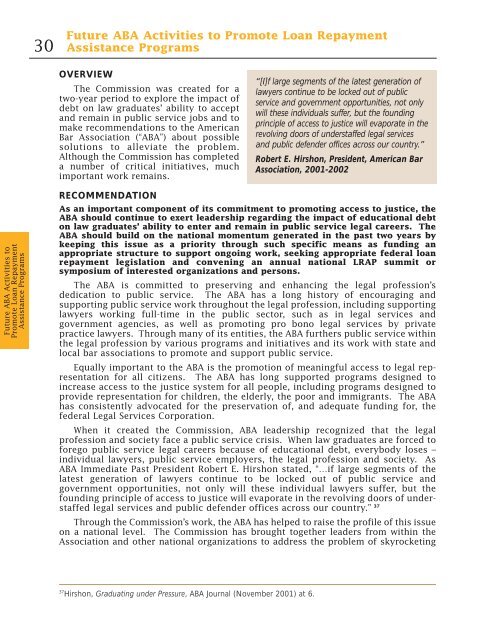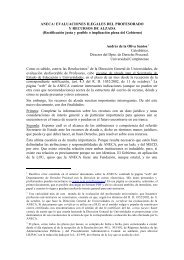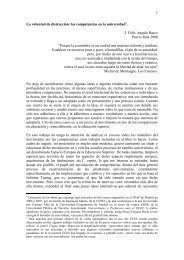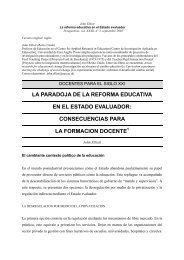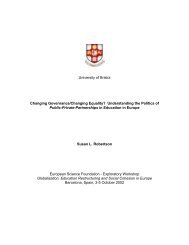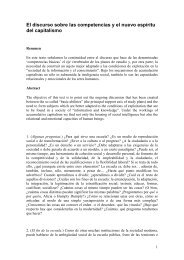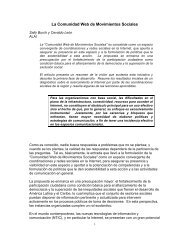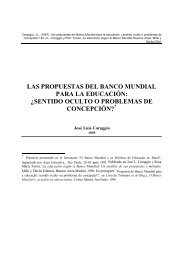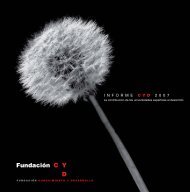monthly debt obligations. <strong>Public</strong> servicelawyers who had worked for two <strong>to</strong>three years in <strong>the</strong>ir current positionrevealed deep frustration at beingforced <strong>to</strong> leave jobs <strong>the</strong>y loved in order<strong>to</strong> satisfy student debt obligations whilesupporting <strong>the</strong>ir families.A number of solutions for relieving<strong>the</strong> debt burden of some law graduateshave developed, including loanrepayment <strong>as</strong>sistance programs, publicservice post-graduate fellowships andpublic service scholarships. Loanrepayment <strong>as</strong>sistance programs(“LRAPs”) provide financial aid <strong>to</strong> lawschool graduates, typically thoseworking in <strong>the</strong> public interest orgovernment sec<strong>to</strong>r. In most c<strong>as</strong>es, thisaid is given <strong>to</strong> graduates in <strong>the</strong> form ofa new and forgivable loan <strong>to</strong> help <strong>the</strong>mrepay <strong>the</strong>ir annual educational debt.Upon completion of <strong>the</strong> requiredservice obligation, <strong>the</strong> LRAP administra<strong>to</strong>rwill forgive or cancel <strong>the</strong> newloan. Most LRAPs contain limits on <strong>the</strong>amount of income a recipient can earnwhile participating in <strong>the</strong> program.There are various types of LRAPs,administered by law schools, state barfoundations, public service employers,and federal and state governments.The number of LRAPs is limited. Manyof <strong>the</strong> existing programs have verylimited resources and are able <strong>to</strong>provide <strong>as</strong>sistance <strong>to</strong> only a smallnumber of public service lawyers.“I graduated from NYU School of <strong>Law</strong> in2002. From <strong>the</strong> time I applied <strong>to</strong> law school,I have been single-mindedly devoted <strong>to</strong> acareer in public interest law. It sounds cliché,but it is <strong>the</strong> gospel truth that I have knownthat I wanted <strong>to</strong> be a civil rights lawyer sinceI read To Kill a Mockingbird <strong>the</strong> summerbefore I entered fifth grade. Growing upspending summers on my grandmo<strong>the</strong>r’s Ohiomuck farm, I remember vividly <strong>the</strong> images ofmigrant work crews that inhabited <strong>the</strong> campacross <strong>the</strong> highway. I remember wonderingwhy <strong>the</strong> laborers’ children slept in inadequatehousing, while I slept in a farmhouse.After law school, I joined <strong>the</strong> Virginia JusticeCenter for Farm and Immigrant Workers,which represents Virginia farm workers ando<strong>the</strong>r low-wage workers in civil rightslitigation. My starting salary w<strong>as</strong> $31,180.My <strong>to</strong>tal educational debt approaches$85,000. Familial contribution <strong>to</strong> my tuitionpayments w<strong>as</strong> well beyond <strong>the</strong> realm ofpossibility. In short, my law school’s loanrepayment <strong>as</strong>sistance program h<strong>as</strong> beeninstrumental in allowing this farm kid <strong>to</strong> livehis dream of growing up <strong>to</strong> be something likeAtticus Finch.”Andrew H. Turner, Virginia Justice Centerfor Farm and Immigrant Workers,Charlotte, VAThis Report includes information about some of <strong>the</strong> existing strategies that havebeen used <strong>to</strong> alleviate <strong>the</strong> law student debt burden and will highlight some successs<strong>to</strong>ries. The Report also provides specific recommendations – <strong>to</strong> <strong>the</strong> ABA, states, lawschools, and <strong>the</strong> Federal Government – regarding strategies that should be explored<strong>to</strong> facilitate new law graduates’ ability <strong>to</strong> enter in<strong>to</strong> and remain in public service legaljobs. In addition, <strong>the</strong> Report contains a number of appendices designed <strong>to</strong>summarize <strong>the</strong> Commission’s publications, educational outreach sessions and <strong>the</strong>ABA’s Federal factsheets highlighting how Congress could help solve <strong>the</strong> problem.When law graduates are prevented from pursuing public service legal careers due<strong>to</strong> high educational debt burdens, <strong>the</strong> consequences <strong>to</strong> <strong>the</strong> profession and society areconsiderable. <strong>Law</strong>yers with dreams of serving <strong>the</strong>ir communities <strong>as</strong> prosecu<strong>to</strong>rs,public defenders or civil legal aid lawyers are unable <strong>to</strong> use <strong>the</strong>ir skills <strong>to</strong> do so. Theprofession is unable <strong>to</strong> promote and provide meaningful access <strong>to</strong> legal representationfor all. When federal, state and local governments are unable <strong>to</strong> hire new lawyersor retain experienced ones, government and its citizens suffer. The ABA h<strong>as</strong> a longstandingcommitment <strong>to</strong> promoting public service and access <strong>to</strong> justice for allpersons, regardless of income. As part of this long-standing commitment, <strong>the</strong> ABA,<strong>as</strong> <strong>the</strong> representative of <strong>the</strong> legal profession, h<strong>as</strong> a duty <strong>to</strong> continue making it apriority <strong>to</strong> promote mechanisms for lifting <strong>the</strong> burden of educational debt <strong>as</strong> animpediment <strong>to</strong> public service careers in <strong>the</strong> law.29<strong>Lifting</strong> <strong>the</strong> <strong>Burden</strong>:The Problem and Its Solutions
30Future ABA Activities <strong>to</strong> Promote Loan RepaymentAssistance ProgramsOVERVIEWThe Commission w<strong>as</strong> created for atwo-year period <strong>to</strong> explore <strong>the</strong> impact ofdebt on law graduates’ ability <strong>to</strong> acceptand remain in public service jobs and <strong>to</strong>make recommendations <strong>to</strong> <strong>the</strong> AmericanBar Association (“ABA”) about possiblesolutions <strong>to</strong> alleviate <strong>the</strong> problem.Although <strong>the</strong> Commission h<strong>as</strong> completeda number of critical initiatives, muchimportant work remains.“[I]f large segments of <strong>the</strong> latest generation oflawyers continue <strong>to</strong> be locked out of publicservice and government opportunities, not onlywill <strong>the</strong>se individuals suffer, but <strong>the</strong> foundingprinciple of access <strong>to</strong> justice will evaporate in <strong>the</strong>revolving doors of understaffed legal servicesand public defender offices across our country.”Robert E. Hirshon, President, American BarAssociation, 2001-2002Future ABA Activities <strong>to</strong>Promote Loan RepaymentAssistance ProgramsRECOMMENDATIONAs an important component of its commitment <strong>to</strong> promoting access <strong>to</strong> justice, <strong>the</strong>ABA should continue <strong>to</strong> exert leadership regarding <strong>the</strong> impact of educational deb<strong>to</strong>n law graduates’ ability <strong>to</strong> enter and remain in public service legal careers. TheABA should build on <strong>the</strong> national momentum generated in <strong>the</strong> p<strong>as</strong>t two years bykeeping this issue <strong>as</strong> a priority through such specific means <strong>as</strong> funding anappropriate structure <strong>to</strong> support ongoing work, seeking appropriate federal loanrepayment legislation and convening an annual national LRAP summit orsymposium of interested organizations and persons.The ABA is committed <strong>to</strong> preserving and enhancing <strong>the</strong> legal profession’sdedication <strong>to</strong> public service. The ABA h<strong>as</strong> a long his<strong>to</strong>ry of encouraging andsupporting public service work throughout <strong>the</strong> legal profession, including supportinglawyers working full-time in <strong>the</strong> public sec<strong>to</strong>r, such <strong>as</strong> in legal services andgovernment agencies, <strong>as</strong> well <strong>as</strong> promoting pro bono legal services by privatepractice lawyers. Through many of its entities, <strong>the</strong> ABA fur<strong>the</strong>rs public service within<strong>the</strong> legal profession by various programs and initiatives and its work with state andlocal bar <strong>as</strong>sociations <strong>to</strong> promote and support public service.Equally important <strong>to</strong> <strong>the</strong> ABA is <strong>the</strong> promotion of meaningful access <strong>to</strong> legal representationfor all citizens. The ABA h<strong>as</strong> long supported programs designed <strong>to</strong>incre<strong>as</strong>e access <strong>to</strong> <strong>the</strong> justice system for all people, including programs designed <strong>to</strong>provide representation for children, <strong>the</strong> elderly, <strong>the</strong> poor and immigrants. The ABAh<strong>as</strong> consistently advocated for <strong>the</strong> preservation of, and adequate funding for, <strong>the</strong>federal Legal <strong>Service</strong>s Corporation.When it created <strong>the</strong> Commission, ABA leadership recognized that <strong>the</strong> legalprofession and society face a public service crisis. When law graduates are forced <strong>to</strong>forego public service legal careers because of educational debt, everybody loses –individual lawyers, public service employers, <strong>the</strong> legal profession and society. AsABA Immediate P<strong>as</strong>t President Robert E. Hirshon stated, “…if large segments of <strong>the</strong>latest generation of lawyers continue <strong>to</strong> be locked out of public service andgovernment opportunities, not only will <strong>the</strong>se individual lawyers suffer, but <strong>the</strong>founding principle of access <strong>to</strong> justice will evaporate in <strong>the</strong> revolving doors of understaffedlegal services and public defender offices across our country.” 37Through <strong>the</strong> Commission’s work, <strong>the</strong> ABA h<strong>as</strong> helped <strong>to</strong> raise <strong>the</strong> profile of this issueon a national level. The Commission h<strong>as</strong> brought <strong>to</strong>ge<strong>the</strong>r leaders from within <strong>the</strong>Association and o<strong>the</strong>r national organizations <strong>to</strong> address <strong>the</strong> problem of skyrocketing37Hirshon, Graduating under Pressure, ABA Journal (November 2001) at 6.


